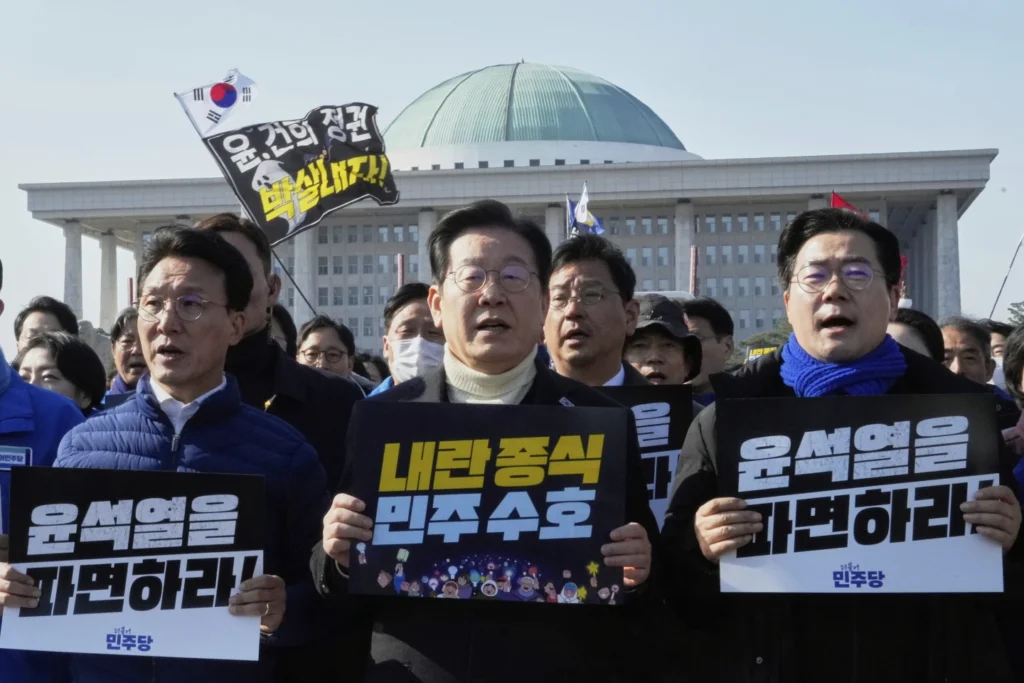South Korea will hold a snap presidential election on June 3, 2025, to choose a successor to President Yoon Suk Yeol, who was ousted from office following his controversial imposition of martial law in late 2024. The announcement was made by Acting President Han Duck-soo just four days after the Constitutional Court unanimously removed Yoon from power, triggering a legal requirement to hold a new presidential vote within 60 days. The elected leader will serve a full five-year term.

The upcoming election is already shaping up to be one of South Korea’s most contentious and politically charged races in recent memory. Deep partisan polarization between the conservative People Power Party and the liberal Democratic Party is expected to dominate the campaign, with both sides vying for control of a nation still grappling with the shock of Yoon’s martial law decree and abrupt removal.
The People Power Party faces an uphill battle. The decision by Yoon to deploy armed troops in the streets of Seoul during a standoff with Parliament severely damaged public trust and fractured the party. Although the People Power Party was not directly responsible for the imposition of martial law, the political fallout has been profound. Many reformist members publicly condemned Yoon and supported his impeachment, creating a rift with loyalists who continued to back the president even in the face of national outrage.
The liberal Democratic Party, meanwhile, is poised to rally behind Lee Jae-myung, its influential leader who narrowly lost to Yoon in the 2022 presidential election. Lee played a central role in mobilizing the party against Yoon’s martial law order and led the effort to impeach him. Analysts widely consider him the front-runner, particularly as no serious challengers have emerged within his party. Lee’s leadership during the crisis and his dominance within the Democratic Party have positioned him as the candidate to beat.
Political parties are expected to launch presidential primaries in the coming weeks to select their nominees. While Lee’s candidacy appears virtually assured, the People Power Party is facing internal chaos. More than ten potential candidates may enter the race, but the party remains fractured between pro-Yoon loyalists and those who supported his removal.
Among the conservative hopefuls, Labor Minister Kim Moon Soo and Daegu Mayor Hong Joon-pyo are seen as staunch Yoon supporters. Both opposed impeachment and are expected to champion Yoon’s legacy. In contrast, former party leader Han Dong-hoon and senior lawmaker Ahn Cheol-soo favored Yoon’s removal and could appeal to more moderate voters. Seoul Mayor Oh Se-hoon has maintained a neutral stance, leaving political analysts to speculate on his positioning.
Yoon, though no longer in office, is expected to exert significant influence over the party’s direction and candidate selection. Having been charged with rebellion in January, Yoon could face additional criminal charges such as abuse of power now that his presidential immunity has been stripped. Observers anticipate that Yoon will back loyalists in the race to protect his interests and counter legal threats.
The People Power Party’s current leadership remains dominated by Yoon allies, making reconciliation with reformist factions difficult. Experts warn that internal divisions may further hinder the party’s ability to present a unified front before the election. Analysts also believe that moderates and younger voters, especially those in their twenties and thirties, will likely determine the election’s outcome. For the conservatives to win, they will need to select a candidate who can transcend party divisions and appeal to the political center.
Lee Jae-myung’s candidacy is not without controversy. While his supporters hail him as a populist reformer, critics accuse him of deepening national divisions and using inflammatory rhetoric against opponents. Lee is currently facing five criminal trials, including corruption charges. If elected, he would benefit from presidential immunity, which would likely halt those legal proceedings.
During his presidency, Yoon repeatedly accused Lee and the Democratic Party of obstructing his reform agenda by leveraging their parliamentary majority to block government initiatives, slash budgets, and impeach senior officials. Yoon justified his martial law declaration as a final attempt to rally public support and defend the presidency against what he described as the “wickedness” of Lee’s party.
Political analysts say that many South Koreans remain skeptical of Lee, believing he manipulated parliamentary power for personal and political gain. Still, his control over the Democratic Party and the purge of internal dissenters has left him with a clear path to the nomination and potentially the presidency.
With only two months remaining before the June 3 vote, South Korea’s political landscape is entering a volatile period. The election is expected to be a high-stakes battle not only between two political parties but between two starkly different visions for the country’s future amid unresolved wounds from its democratic past.



